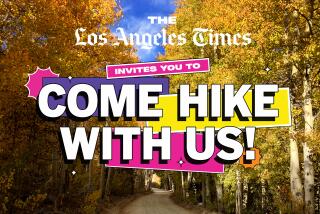This hikeâs all about attainable goals
If folks are looking for the challenge of a lifetime, this is not it. But if they are trying to get in a good climb, hike or walk, this is great. The views donât hurt either.
I started hiking about three years ago, when I moved to Montecito Heights, just northeast of downtown. My friend Rodney Hoffman, who also was one of my professors at Occidental College, invited me on his Sunday hikes in the nearby park. The locals call it Debs Park, but officially itâs Ernest E. Debs Regional Park.
At more than 200 acres, the park offers many options. This hike can be as long as you make it. Like most Angelenos, we tend to measure the hike in time rather than distance, so weâll go for at least 90 minutes or up to 2 1/2 hours if there are things we really want to see.
This relatively gentle hike is punctuated by a series of climbs. You have to be prepared for the hills. We usually head out about 9 a.m., earlier if itâs hot. On a typical hike, we begin by climbing one of the steeper trails. Before we reach the top, we usually stop at least once to take in the views of downtown or the coast. Of course, sometimes we just stop to catch our breath.
We are usually hiking on a dirt path or fire roads, and weâll see eucalyptus trees that were planted years ago as well as pines at the top and sycamores below. The area is thick with California black walnut trees, which are fairly endangered. This is one of the few areas that has them that is also relatively pristine. The Audubon Society has identified about 200 bird species in the park, but we rarely see them. We hear them, though.
At the top, thereâs a small pond that the locals use as a fishing hole. Sometimes a dog will be fetching a stick out of the water or a family will be picnicking in the shade of nearby trees.
Part of the hike leads to a ridge that overlooks the Audubon Center, the newest addition to Debs Park, which opened in November. We watched its construction from Day One, just as we saw the Metro Gold Line go up. The ridge, along with many other spots, also provides amazing views of the Southwest Museum in Mount Washington, as well as the Arroyo Seco Parkway, Highland Park and beyond to the cities of Glendale and Burbank.
Weâll often wind our way down one of the fire roads that crisscrosses the park, past the Audubon Center and into the Arroyo Seco, the mostly dry riverbed that parallels the Pasadena Freeway. On other days, weâll make our way down one of several ravines or hills.
Debs Regional Park may not be the wilderness or an extreme hike that many crave, but it is a great place to get away from the bustle of the city while never really leaving it.
The particulars
Where: Ernest E. Debs Regional Park, 4235 Monterey Road, Highland Park
What: The Los Angeles city park with 282 acres of natural wilderness has almost 8 1/2 miles of maintained trails and a reservoir in which fishing is allowed.
How: From Los Angeles, take the Pasadena Freeway to Via Marisol, turn right. Make a sharp right onto Monterey Road, which is temporarily closed to cars while improvements are being made. The park can also be accessed via the Audubon Center, 4700 N. Griffin Ave.
Back story: Ernest E. Debs, who died in 2002 at 98, served on the Los Angeles County Board of Supervisors from 1958-74, when supervisors were all-powerful in their districts and the board was known as âthe five little kings of the county.â The decision to build the $5-million Audubon Nature Center was reportedly motivated by the Audubon Societyâs desire to make nature more accessible to inner-city residents.
More to Read
Sign up for The Wild
Weâll help you find the best places to hike, bike and run, as well as the perfect silent spots for meditation and yoga.
You may occasionally receive promotional content from the Los Angeles Times.






